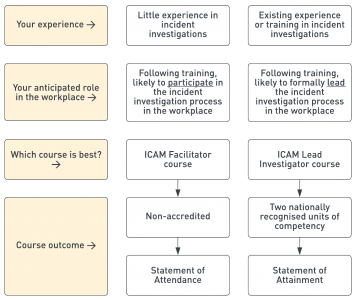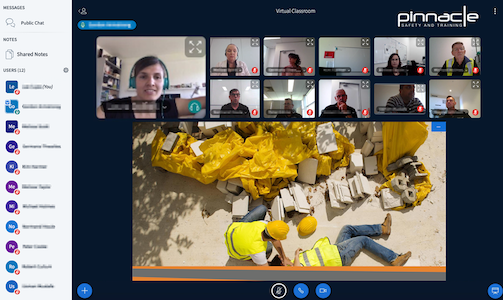No region selected
ICAM Facilitator Training
Face to Face
Provides an overview of incident investigation using the ICAM methodology, aimed at team members participating in an investigation under the guidance of a Lead Investigator.

Level 1 = ICAM Facilitator (this course)
Level 2 = ICAM Lead Investigator (learn more)
Course Dates
| Location (Gold Coast) | Start Date | Places Left |
|---|---|---|
|
No dates for this region? Click here to see course dates in other centres near you. For group bookings please call us on 1300 990 810. |
Course Details
Certification
This is a non-accredited training course. Participants who complete this course will receive a Statement of Attendance. This certificate is issued by Pinnacle Safety and Training (RTO 40496).
Course Duration
1 day (approximately 7 hours)
Format Options
- Option 1 - Face-To-Face

- Option 2 - Virtual Classroom (‘Zoom’-style trainer-facilitated online session)

Price
- $695.00 pp for public courses
- For group bookings outside our public course schedule or at your location, please submit your group booking enquiry here for an obligation free quote.
Course Overview
ICAM stands for Incident Cause Analysis Method. ICAM is an investigation methodology for use in a whole range of industries including aviation, transport, mining, rail, security and health and draws on the work of Professor James Reason.
This ICAM Facilitator course has been developed to complement Pinnacle’s ICAM Lead Investigator program. The ICAM Facilitator course is a 1-day, non-accredited course, and provides participants a foundation of ICAM knowledge that is an excellent ‘stepping stone’ to ICAM Lead Investigator.
The Facilitator course is aimed at participants who have little real-world experience with incident investigation, and who may be required to form part of an investigation team in their workplace. Participants will be equipped with the knowledge to assist in ICAM investigations.
The course introduces the key concepts of incident investigation under the ICAM methodology. To explore these concepts, participants will undertake several group-based activities based on a simulated incident scenario.
Course Outline
- Overview of Incident Cause Analysis Method history, purpose and objectives
- The legal requirements applicable to incident investigation
- Identifying and collecting forms of evidence for the investigation
- Interviewing witnesses
- Identifying causative factors for accidents and incidents using accident causation models
- Forming recommendations for remedial actions
- Communicating the outcomes of investigation
Choosing Your ICAM Course

Course Inclusions
- Training conducted by an experienced ICAM Investigator with strong background in on-site incident investigation
What is a "Virtual Classroom"?
A Virtual Classroom is an online learning environment that allows for live interaction (audio and video) between a trainer and their participants as they are participating in learning and assessment activities.

Face-To-Face (In-Person) or Virtual Classroom?
A number of important factors must be considered in determining which delivery format may be right for you. These include (but aren’t limited to):
- Computer hardware, peripherals and environment
- Do you have a modern laptop or desktop computer?
- Can you ensure you are in a quiet room for the duration of your sessions?
- Do you have a headset or headphones with a microphone (such as those supplied with mobile phones) compatible with your computer?
- Do you have a webcam?
- Do you have a reliable and fast internet connection suitable for streaming video?
If the answer to any of the above questions is “no”, we recommend attending one of our face-to-face sessions. Participants who elect to undertake their training via Virtual Classroom must agree with all terms and conditions pertaining to this mode of delivery.
Computer Literacy
Participants undertaking this program via a “Virtual Classroom” format (i.e. real-time ‘Zoom’-style remote-learning) require a strong level of computer literacy.
To be successful in this course you need to:
Participants must
- Be at least 18 years of age
- Have at least a Year 12 level of numeracy, literacy and communication skills
- Have the ability to read and write English. If English is a second language, you will need to complete a language, literacy and numeracy (LLN) questionnaire. Contact us to discuss.
- Agree with all terms and conditions of your enrolment
For our public (face-to-face) courses at our purpose built training facility trainees must provide:
- Transport
- Lunch
- Certificate IV in Work Health and Safety
- Diploma of Work Health and Safety
- Work Health and Safety for Supervisors and Managers
- Health and Safety Representatives (HSR) Training
- Health and Safety Representative (HSR) Refresher Training
- Health and Safety Committee (HSC) Training
- White Card Training
- Manual Handling Training
- Silica Awareness
- Risk Control Training
- Hazardous Areas Awareness
- Occupational First Aid Training
- ICAM Facilitator Training
- ICAM Lead Investigator Training
- Chain of Responsibility
- Health and Safety Representative (HSR) Initial OHS Training Course
Student Links
I literally wouldn’t change a thing. I have done a fair few courses now and I found Jo to be the best facilitator I have had. He was very patient and he had genuine knowledge about the course. Pinnacle are very lucky to have a team member like Jo. I would gladly have him facilitate all my courses. “Knock knock, spot audit!” Hahaha gets me every time!
